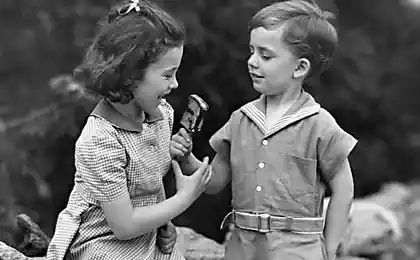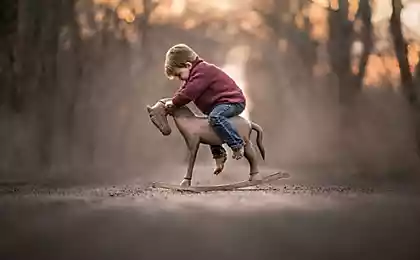665
Boys don't grow by themselves! 3 IMPORTANT stages of development of the son
Boys don't grow by themselves, exactly and smoothly. There is no such that you be bothered only by the fact that cram their child with useful grasses, provide him with clean shirts and one day your boy wakes up a real man! You need to follow a particular education program.
If the boy is constantly in your attention, you probably noticed how it grows by the day as changing his mood and energy in different periods of life. The challenge is to understand what is required of the child and when.

Fortunately, the boys today were born, and we are not pioneers in matters of their education. Every world culture faced with the problem of educating boys and offered their solutions. It is only in the last decade, when the pace of life was particularly rough, we lost sight of the need to create a real program of education for boys. We are just too busy with other things!
Three stages of adolescence are universal and exist outside of time. Discussing them with their parents, every time I hear: "Right!", because the experience of education confirms the correctness of these postulates.
Briefly about three stages of development
1. The first stage covers the period from birth to six years of age, during which the boy is tight with his mother. This is the "it" boy, even though the father may play a very important role in a child's life. The purpose of education in this period was to deliver the boy a lot of love and a sense of security, "charge" him for life as a great and exciting journey.
2. The second stage lasts from six to fourteen years the age period during which a boy, following his own inner feelings, wants to learn to be a man and is increasingly eyeing the father, his interests and actions. (Though the mother remains a very close friend, and the world is becoming more interesting.) The purpose of education in this period is to increase the level of knowledge of the child and to develop his abilities, not forgetting the kindness and openness - that is, to strive to develop a harmonious personality. At this age your son comes a sense of joy and comfort because he's a boy.
3. Finally, the period from fourteen years to adulthood - when he requires the assistance of a male mentor, if he wants to be fully prepared for adult life. Mom and dad a few on the back burner, but they must find his son a worthy mentor, so he wouldn't have to settle for the knowledge and experience of their incompetent peers. The purpose of education at this stage is to teach skills, instill a sense of responsibility and self-esteem, actively involving adulthood.
Please remember that these stages in any case do not suggest a sudden or abrupt transition effects on the child from one parent to another. Best when both parents take an active part in the son's life from childhood to adulthood. The stage of adolescence only indicate the shift in emphasis: for example, the father comes to the fore in the son's age from six to thirteen years, and the influence of mentors increases from the age of fourteen. The main criteria for the selection of a mentor are safety and honesty.
Knowing about these three stages, we can clearly identify a programme of action. For example, it is clear that fathers of boys aged six to fourteen years shall not be workaholics like should not be eliminated from the family either morally or physically. If this happens, it is only to the detriment of the sons. (And yet modern fathers are doing just that, many of us can attest from the experience of his childhood.)
Stage of development of the boys suggest that we need more help from the community when our sons reach adolescence. Once this support was provided by the relatives (uncles and grandfathers) or craftsmen, who took the boys to the disciples and apprentices.
Unfortunately, today too often happens that teenagers go out into the world, but there's like no one's helping hand, and they are forced to spend her adolescence and youth in threat of homelessness. Some never grow up.
It is fair to say that many problems — especially those related to the behavior of boys, their lack of motivation in school, and then trouble with the law (drunk driving, fights, etc.) stem from the fact that we didn't know about the features of a boy's development and had not provided them with the necessary assistance.
Know the three stages of development of boys is necessary, therefore, we must consider them in detail and decide how to respond. What we are doing now.
From birth to six: the tender years
Babies have babies. It's a girl or boy does not matter neither for the child nor for the parents. Babies love when they are held, played with them, squeezing, and they're pretty giggle; they like to observe the world around. Temperament of infants is very different. With some fairly easy — they are calm and relaxed, sleep for a long time. Other noisy and restless, always requires action. Someone fearful and restless, needing constant confirmation of the fact that beside him there is someone that love him.
In this period of life it is necessary that the kid felt the connection, at least one person. Usually with my mom. With much enthusiasm and high motivation, besides skamlova him with their milk, by nature endowed with a special softness and tenderness in the approach to the child, the mother is the most prepared to fully meet the needs of the baby. Own hormones (especially prolactin, generated in the process of breast-feeding) cause in the woman a desire to be with your child and focus on it all the attention.
With the exception of breastfeeding, dads also can provide all the needs of a newborn, only they do it a little differently. Studies show that they are more active in the games with the child like to excite him, while the mother tried to calm him down. (However, when fathers as well as mothers, begin to suffer from lack of sleep, it is not to noisy and they are also not averse to calm the child!)
The first manifestation of the difference of the sexes
Some genetic differences between girls and boys begin to emerge in infancy. The boys are less receptive to others. The girls developed a stronger sense of touch. Boys grow faster and increasingly gaining traction, although the separation from the mother is perceived sharper. When children begin to walk, the difference between girls and boys becomes even more pronounced. Boys generally need more space for games and movement. They like to grab objects and manipulate them, build high towers of blocks, while girls prefer to mess on the floor. In kindergarten, the boys ignore the appearance in the brand-new group, and the girls immediately notice them and make friends.
Sadly, adults treat boys more harshly. Studies show that parents embrace and caress the girls more often, even in newborn age. Boys talk less. And mom and often hurt punish the boys.
If the mother is the main source of affection and care, for the boy she becomes the first model for love and tenderness. Starting from the second year of a child's life when he starts walking, the mother can firmly, without offending and stydia boy, to establish the boundaries of their relationship, and the boy will internalize it for life. He knows that in his mother's heart he holds a special place.
When mother interest and pleasure in teaching the boy, talking to him, it helps the development of his language skills, sociability. In the future we will see how important it is for boys, as they to a greater extent than girls, need help in mastering communication skills.
If in the first year or two of life of the son of the mother is in deep depression and closed to communication with the child, in his mind appears the aspect of sadness. If mom gets angry, beats or abuses his son, he begins to doubt his love. Mothers need support and assistance from other family members, so she was able to rest, relax and find time to communicate with the child. She needs to take care of yourself, then she will be able to fully care for the child.
The mother expressed enthusiasm, seeing as her kid chasing lizards or sculpts out of sand miles from anywhere, she is proud of his achievements. Father squeezes son, plays with him in the struggle and also shows the tenderness and care, reads books, comforting when a child is sick. The baby understands that men are good and at the same time with them wondering what they can read books and help around the house.
Home is best
If possible, the boy should stay home with one parent, until he reaches the age of three. The nursery or at home babies do not too suitable for the care of boys up to three years. Studies show that boys more than girls, tend to experience separation, they have often observed emotional distress from feelings of abandonment. The result of developing anxiety and aggression, and this pattern of behavior persists, the boy and the school.
Care from a loving parent or family care is much more preferable. Small children need the presence of loving person. The first lessons that the boys need to learn in this life, it's lessons of kindness, trust, warmth and joy.
In short...
To six years the sex of the child does not have special meaning and should not focus on this aspect. Usually, mothers are the closest person to the child, but the father's role is also not to be underestimated. The most important thing for a child in this period of life to be the center of attention and feel the presence of two loving parents. So he develops a sense of security, the primary skills of communication and thirst for knowledge and interaction with others.
However, this period passes quickly. So catch the moment and enjoy your baby!
From six to thirteen: interest in masculinity
In six years with the boys undergoing a major metamorphosis. They like waking up dozing still masculinity. Even those boys who do not watch so much television, suddenly begin to show interest in weapons, want to wear caps supermen, to fight and to fight, to play noisy games. Occurs and something else very important: and this is true for all countries and cultures.
Around the age of six, boys like snap to the father or the grandfather, or another man. Awakens in them the desire to be with a man, learn from him, emulate. They want to "learn to be a man."
If in this period, the father ignores the son, the boy often satisfied with wild antics, just to attract his attention.
To attract the attention of the father, the boys can start to steal, urinate in bed, to show aggression in school, commit other indiscretions.
Mom's still mean a lot
This sudden change of interest in the father does not mean that mom leaves the stage. In some countries (e.g. the United States) mothers often distanciruemsa from their six-year-old sons to add "stiffness". (At this age in Britain send their children to boarding schools.) But, argues Olga Silvershtayn in his book "Courage in raising real men", this idea is insidious. Boys need to know they can rely on the mother, and we should not suppress them affection. Best of all, if the boy will be close to my mother, of course, despite the fact that next will be father. If the father feels that the son is too involved in the interests of the mother (which can happen), he needs to strengthen his influence — in any case not criticizing the mother. Sometimes the father is too strict or makes the son high demands, and he begins to fear him.
If at an early age, his mother suddenly moves away from son, or deprive him of warmth and attention, the result is sad: the boy, trying to drown out the hurt and pain, like cutting the strings that connected it with the mother, tenderness and love.
Instinct tells him that it's hard to muster warm feelings if they do not resonate with the mother. If the boy puts such a damper, it will grow quite abrupt and rude and is unlikely to show warmth and tenderness towards his children and wife. We all know very well these men (bosses, fathers, husbands) who are emotionally pinched and are unable to establish contact with people. Can we do so that our sons were not, and this just often need to hug them — in five, ten, and fifteen years.
Five commandments of fatherhood
We offer you to learn some more lessons of fatherhood.
1. Start as early as possible. Participate in the process of education with the pregnancy. Speak with the mother about their hopes related to the child, participate in baby care since his birth. This is a key step in building future relations. Child care at an early stage disciplinarum you and changes your priorities in life.
Keep in mind that fathers who are caring for newborns, tune with them, is the so-called deep dive. By the way, men do an excellent job to calm the child in the night — cradle him, rock, sing songs! Do not turn into hen, but strictly follow the advice of the child's mother or other experienced mentors. And be proud of your accomplishments. Even if you are too busy with work, a weekend or use vacation time to pay attention to the child. From the age of two the baby, advise the mother to leave you with the child on weekends and you will understand what an excellent job with his role.
2. Take the time. This is the most important. Dads, remember: If during the week you spend at work fifty-five to sixty hours, including travel, you are simply unable to fulfill their paternal responsibilities. Your sons will have problems in life, and it will certainly affect you. Fathers need to come home in time to play, laugh, teach their children to frolic with them. Work in corporations and small business becomes an enemy of the family. Fathers often choose lower earnings, but have the opportunity to spend more time in the family. So, next time you are offered a promotion, requiring more long working hours and frequent business trips, seriously consider to meet your boss: "Sorry, but my children, first and foremost."
3. Do not hold back emotions. Embrace the son, to frolic with him, play fighting is not forbidden until maturity! Combine these noisy games with quiet time: children are very receptive to stories, they like to just sit next to my father, to sing or to play music. Tell your children about what they are smart, beautiful, creative (praise them often and sincerely). If your parents were not so open in showing feelings, you will have to learn this.
Some men fear that the display of affection in respect of the son will make it "blue". It is not so. Moreover, the reverse is true. Many gay and bisexual men with whom I have talked to recognize that the lack of paternal affection partly explains their craving for male affection.
4. More fun. Rejoice in their children. If you spend time with them only out of guilt or obligation, it will not bring use. Try to find such activities that you like both. Save children from the "burden of duty", but strongly encourage them to ensure that they help around the house. Limit their extracurricular activities to one or two sports or other activities, so that they had time to just be themselves. Organize their free time, so they do not wander aimlessly, and will devote his walks, games, talks. Avoid excessive competition in the games. Teach your children, share with them all they know.
5. Do not forget about discipline. Today, many fathers have chosen for themselves the role of "doting daddy", leaving all the difficult parenting questions to their second halves. But we still advise men to participate in decisions, to monitor how the child does the homework and performs work on the house. Set standards of discipline — calmly but firmly. Do not resort to physical abuse, although sometimes the temptation to spank the boy. Insist on respect. Do not play small. Be sure to listen to the child and consider his feelings and experiences. Discuss with the mother of the child global issues of education: "if All we succeed? What needs to change?" Joint raising a child is brings together parents.
The search for the object to follow
The boy at the age of six to fourteen years of age still loves his mother and can learn a lot from her. But his interests are changing: it is increasingly drawn to learn from men. The boy realizes that he's growing up. And, if development was to be complete, it should "load into itself as much data as possible" from men.

Mother remains only to quietly accept it, warmth and willingness to provide support.The task of the father to gradually increase their participation in education. If the father is not around, the boy starts to look for the man in your environment — for example at school. But today among teachers, fewer men, especially in elementary school, and this creates a particular problem.
A single mother
Thousands of years single mothers had to raise boys on their own. There is no doubt that women can raise good men, but — and this is a big but — those women with whom I have talked to always emphasized that they found in their environment men worthy of emulation, calling on the help of family, friends, school teachers, sports coaches, leaders of youth organizations (by selecting them with great care to avoid the risk of sexual harassment).
In short...
While the boy is studying in primary and secondary school, he needs to spend more time with his father and mother, to give them help, acquiring from them the vital knowledge and experience while enjoying their company. From an emotional point of view, the father in this period comes to the fore. The boy is ready to learn from him, listen to his words. As a rule, he begins to be father. Mother has enought mad!
This time period — from six to fourteen years the father provides an ideal opportunity to influence the son (and to lay in him the foundations of man's nature). This is the time that should be spent with use. Any minor things go for good: and games in the fresh air on summer evenings; and walks, accompanied by talk of "life" and stories about their own childhood; and joint Hobbies or sports. It was during this period in memory of your son laid the pleasant memories of childhood that will nourish him all his life.
Do not worry if your son is overly coolly: surely this style of behavior is accepted in his school. Persist, and you will find that under the mask of feigned indifference hides a cheerful and playful child. Do not miss the opportunity to spend son time if he really wants to be in your company. Closer to youth interests will tighten in the world. All I can do is encourage you: do not miss your chance to participate in the life of the son!
Fourteen and older: becoming a man
Around the age of fourteen years begins a new stage of adolescence. Usually at this age boys are significantly stretched in height, but in body is a dramatic change: the testosterone level increased by almost 800 percent!
Although all individually, but at this age they have something in common: they become more stubborn, restless, frequently changing mood. And it's not that they change for the worse, just gave birth to a new identity, a birth always involves struggle. They need to find answers to serious questions, to plunge into new adventures, to set ourselves new targets, define the priorities for the future — and meanwhile, the internal clock rushing them to live.
I believe that in this age, we increasingly lose contact with their children. It just so happened that we made to the adolescents a standard set of requirements: more diligence in school, lots of work around the house. But the teenager needed something more. He and hormonally, and physically breaks into the adult world, and we want to hold him in childhood for five more years-six! It is not surprising that problems arise.
And really need to raise the boy's spirit to direct his passion in creative direction, to give him the opportunity to spread your wings. All the troubles that are parents in the form of nightmares (teenage adventurism, alcohol, drugs, crime), come from the fact that we do not find channels for splash teenage thirst for glory and heroism. The boys look at adult world and do not see anything that they would like to believe or participate. Even their protest is packaged and offered as a commodity by advertisers and the music industry.
Guys want to break through there, where cleaner and better, but this place is not visible.
How did the ancient
In any civilization — from Eskimos to African tribes, in all times and on all continents of the adolescent boys received special attention and care from the whole community. Ancient cultures knew and we are still only beginning to learn - that parents can't raise boys without the help of other adults who can be trusted and who show a desire to participate in the process of education on a long term basis.
One reason for this approach lies in the fact that fourteen-year-old sons and their fathers brought each other to rabies. Often the father can only love the son. But to love and to teach is not obtained. (Remember how your father taught you to drive?) Somehow, the two men certainly face their foreheads, and this only exacerbates the problem. If someone else comes to help, fathers and sons become much calmer. (Even some films — for example, "In search of Bobby Fischer" and "a Trip out of town" with Albert Finney in the title role.)
Traditionally practiced two methods that helped the young man to enter adult life. First, the teen was taken under the wing and guided on the right path adult men who could teach their craft. Second, at certain stages of mentoring the elders of the family or tribe performed the initiation of young men into the mysteries of the profession. This process involved significant testing, aimed at the initiation of boys to adulthood.
Initiation into the tribes lokotov
Native Americans of the Lakota must be known to you from the film "Dances with wolves". It was a tribe of energetic and successful people with a rich culture, marked particularly warm relations between men and women.
Around the age of fourteen boys of the Lakota were subjected to the peculiar test of strength, the so-called test vision. The boy had to climb to the top of a mountain and sit there waiting for the visions or hallucinations caused by hunger. It was assumed that the vision will appear in the image of a heavenly being, which will keep the boy for life. While the boy was shaking on top of the mountain, he heard from the darkness, menacing growl, mountain lions. In fact, these sounds have issued the men of the tribe, who ensured the safety of the child. Boys were too valuable for the tribe, and to expose them to pointless risk, no one was going.
When the teenager returned to the tribe, his success were noted. But starting from this day for two years, he was not allowed to speak with his mother.
Mother to the tribe Lakatos as the women of all tribes of hunter-gatherers is very close and gentle with their children, and children often sleep with them in their huts. The Lakota believed that if the boy talks with his mother immediately after the rite of passage into man, the temptation to return to childhood would be too large and it will be again in women's world and never grow up.
After two years there is a ceremony of reunion of mother and son, but by this time the son was already a man, and his relationship to his mother in keeping with his new status. Women who heard this tradition from my mouth, found it very moving, both sad and joyful. Mother's tribe Lakatos consciously let go of their children, confident that in return they will receive love, respect and friendship on the part of their grown-up sons.
A sharp contrast with the customs of the tribe Lakatos are the modern relations between mothers and sons, which (as pointed out, Babbett Smith in the book "Mothers and sons") often remain shy, childish, and indifferent. The sons are afraid to stay close to his mother and however, already becoming men, still can not break away from the mother's care. They transferred their dependence on relations with any another woman. Do not pass the rite of initiation into the male fraternity, they don't trust men and don't believe in male friendship. They don't want to make commitments to women, fearing that they will again be motherly and controlling. So there are "no" men.
Leaving only the female world, young people can break the mother's shell and begin to treat women like an adult. Domestic violence, infidelity, failure in marital life not necessarily result from problems with women, the reason is just that the boys didn't put the path of transformation.
You can doubt that in ancient times mothers, and fathers too, without fear, gave their sons in the wrong hands. But in fact reason to fear was not. As mentors were men who knew well and trusted. Women understood and welcomed this help, because intuitively felt the need for it. Releasing the family of a troubled teenage boy, they got back a Mature and self-sufficient young man who then certainly have been proud.
Initiation into adulthood was not a one-time event. Sometimes it would take months to teach the boy to behave like a man, to take responsibility, to gain strength, become a real man. We are not too knowledgeable about the details of such rites. Sometimes they were cruel and terrible (and we in any case do not want to repeat), but they were held for a purpose, thoughtfully, and the results were impressive.
Summarizing the experience of our ancestors, we can say: the survival of any tribe depended on the education of informed and responsible young people. It was a matter of life and death, and treated him with the utmost seriousness. Each society has developed its programme of education of young people, involving the Union of efforts of the entire adult population.
In the modern world
Today, mentoring is most often absent or exists in episodic form. Themselves teachers, sports coaches, relatives, teachers, bosses rarely understand their role and, as a rule, perform it poorly. Mentoring is usually carried out in the workplace, in the framework of the program of mastery of work skills and improving skills. All this remained in the past. Working on weekends at a local supermarket, the young man is unlikely to meet the mentor.
If there is no mentor
If there is no mentor, the young man may face many problems on his way to adulthood. He can get involved in a useless struggle with their parents trying to assert itself and defend its own independence. And can fall into depression and isolate themselves. Children of this age have to seek answers to very difficult questions — about sex, career choice, attitude towards drugs and alcohol. If mother and father continue to pay child plenty of time to live his interests, he willingly shares with them his thoughts and doubts. But sometimes teenagers feel the need to talk with other adults. In one study, it was found that the presence of an adult friend outside the family saves a teenager from criminal connections. (Of course, unless this friend is not the criminal element.)
Young people try to choose their path in life. They can find their own interest in religion may get caught up in the Internet, to get involved in music or sports, surfing or rock. If we are not able to organize children's interests, they will create their own groups. But the problem is that these groups can become a community of lonely hearts and no skills and knowledge the kids won't get. A boyish company based only on the flimsy ties and common interests and support them.
Worst of all, if we abandon teenagers to their fate. That's why we need a truly professional teachers, sports coaches, leaders of scout organizations, young workers — in General, adults who are interested in the younger generation. We need people who can bring order to the lives of Teens.
Today the most active in the process of education of the mother and paternity is still reborn. And yet society remains a challenge to find good mentors.
Shortly about the main thing...
1.In the period from birth to six years, boys need a lot of attention and affection that they learned to love. Conversing with them and teaching, we help them to enter this world. As a rule, the best with this role copes mother, although the father can take part in the process.
2.Around the age of six years the boy begins to show a great interest to all men, and the father becomes the primary parent. Matter how much time and attention will he given to the son. A mother's role is still important, and it should not move away from him only because he was older.
3.Fourteen boys need mentors — adults who show personal concern for them and help to gradually move into the larger world. In ancient civilizations was adopted by a rite of passage, and mentoring was an indispensable attribute of education.
4. Single mothers can raise a boy, but they need to carefully approach the question of choosing men as a worthy model for imitation. In addition, single mothers should be given more time to care about their health (because they do the work for two).
© Steve Biddulph from the book "Raising boys"
P. S. And remember, just changing your mind — together we change the world! ©
Source: adalin.mospsy.ru/l_03_00/l0301183.shtml
If the boy is constantly in your attention, you probably noticed how it grows by the day as changing his mood and energy in different periods of life. The challenge is to understand what is required of the child and when.

Fortunately, the boys today were born, and we are not pioneers in matters of their education. Every world culture faced with the problem of educating boys and offered their solutions. It is only in the last decade, when the pace of life was particularly rough, we lost sight of the need to create a real program of education for boys. We are just too busy with other things!
Three stages of adolescence are universal and exist outside of time. Discussing them with their parents, every time I hear: "Right!", because the experience of education confirms the correctness of these postulates.
Briefly about three stages of development
1. The first stage covers the period from birth to six years of age, during which the boy is tight with his mother. This is the "it" boy, even though the father may play a very important role in a child's life. The purpose of education in this period was to deliver the boy a lot of love and a sense of security, "charge" him for life as a great and exciting journey.
2. The second stage lasts from six to fourteen years the age period during which a boy, following his own inner feelings, wants to learn to be a man and is increasingly eyeing the father, his interests and actions. (Though the mother remains a very close friend, and the world is becoming more interesting.) The purpose of education in this period is to increase the level of knowledge of the child and to develop his abilities, not forgetting the kindness and openness - that is, to strive to develop a harmonious personality. At this age your son comes a sense of joy and comfort because he's a boy.
3. Finally, the period from fourteen years to adulthood - when he requires the assistance of a male mentor, if he wants to be fully prepared for adult life. Mom and dad a few on the back burner, but they must find his son a worthy mentor, so he wouldn't have to settle for the knowledge and experience of their incompetent peers. The purpose of education at this stage is to teach skills, instill a sense of responsibility and self-esteem, actively involving adulthood.
Please remember that these stages in any case do not suggest a sudden or abrupt transition effects on the child from one parent to another. Best when both parents take an active part in the son's life from childhood to adulthood. The stage of adolescence only indicate the shift in emphasis: for example, the father comes to the fore in the son's age from six to thirteen years, and the influence of mentors increases from the age of fourteen. The main criteria for the selection of a mentor are safety and honesty.
Knowing about these three stages, we can clearly identify a programme of action. For example, it is clear that fathers of boys aged six to fourteen years shall not be workaholics like should not be eliminated from the family either morally or physically. If this happens, it is only to the detriment of the sons. (And yet modern fathers are doing just that, many of us can attest from the experience of his childhood.)
Stage of development of the boys suggest that we need more help from the community when our sons reach adolescence. Once this support was provided by the relatives (uncles and grandfathers) or craftsmen, who took the boys to the disciples and apprentices.

Unfortunately, today too often happens that teenagers go out into the world, but there's like no one's helping hand, and they are forced to spend her adolescence and youth in threat of homelessness. Some never grow up.
It is fair to say that many problems — especially those related to the behavior of boys, their lack of motivation in school, and then trouble with the law (drunk driving, fights, etc.) stem from the fact that we didn't know about the features of a boy's development and had not provided them with the necessary assistance.
Know the three stages of development of boys is necessary, therefore, we must consider them in detail and decide how to respond. What we are doing now.
From birth to six: the tender years
Babies have babies. It's a girl or boy does not matter neither for the child nor for the parents. Babies love when they are held, played with them, squeezing, and they're pretty giggle; they like to observe the world around. Temperament of infants is very different. With some fairly easy — they are calm and relaxed, sleep for a long time. Other noisy and restless, always requires action. Someone fearful and restless, needing constant confirmation of the fact that beside him there is someone that love him.
In this period of life it is necessary that the kid felt the connection, at least one person. Usually with my mom. With much enthusiasm and high motivation, besides skamlova him with their milk, by nature endowed with a special softness and tenderness in the approach to the child, the mother is the most prepared to fully meet the needs of the baby. Own hormones (especially prolactin, generated in the process of breast-feeding) cause in the woman a desire to be with your child and focus on it all the attention.
With the exception of breastfeeding, dads also can provide all the needs of a newborn, only they do it a little differently. Studies show that they are more active in the games with the child like to excite him, while the mother tried to calm him down. (However, when fathers as well as mothers, begin to suffer from lack of sleep, it is not to noisy and they are also not averse to calm the child!)
The first manifestation of the difference of the sexes
Some genetic differences between girls and boys begin to emerge in infancy. The boys are less receptive to others. The girls developed a stronger sense of touch. Boys grow faster and increasingly gaining traction, although the separation from the mother is perceived sharper. When children begin to walk, the difference between girls and boys becomes even more pronounced. Boys generally need more space for games and movement. They like to grab objects and manipulate them, build high towers of blocks, while girls prefer to mess on the floor. In kindergarten, the boys ignore the appearance in the brand-new group, and the girls immediately notice them and make friends.
Sadly, adults treat boys more harshly. Studies show that parents embrace and caress the girls more often, even in newborn age. Boys talk less. And mom and often hurt punish the boys.
If the mother is the main source of affection and care, for the boy she becomes the first model for love and tenderness. Starting from the second year of a child's life when he starts walking, the mother can firmly, without offending and stydia boy, to establish the boundaries of their relationship, and the boy will internalize it for life. He knows that in his mother's heart he holds a special place.
When mother interest and pleasure in teaching the boy, talking to him, it helps the development of his language skills, sociability. In the future we will see how important it is for boys, as they to a greater extent than girls, need help in mastering communication skills.
If in the first year or two of life of the son of the mother is in deep depression and closed to communication with the child, in his mind appears the aspect of sadness. If mom gets angry, beats or abuses his son, he begins to doubt his love. Mothers need support and assistance from other family members, so she was able to rest, relax and find time to communicate with the child. She needs to take care of yourself, then she will be able to fully care for the child.
The mother expressed enthusiasm, seeing as her kid chasing lizards or sculpts out of sand miles from anywhere, she is proud of his achievements. Father squeezes son, plays with him in the struggle and also shows the tenderness and care, reads books, comforting when a child is sick. The baby understands that men are good and at the same time with them wondering what they can read books and help around the house.
Home is best
If possible, the boy should stay home with one parent, until he reaches the age of three. The nursery or at home babies do not too suitable for the care of boys up to three years. Studies show that boys more than girls, tend to experience separation, they have often observed emotional distress from feelings of abandonment. The result of developing anxiety and aggression, and this pattern of behavior persists, the boy and the school.
Care from a loving parent or family care is much more preferable. Small children need the presence of loving person. The first lessons that the boys need to learn in this life, it's lessons of kindness, trust, warmth and joy.
In short...
To six years the sex of the child does not have special meaning and should not focus on this aspect. Usually, mothers are the closest person to the child, but the father's role is also not to be underestimated. The most important thing for a child in this period of life to be the center of attention and feel the presence of two loving parents. So he develops a sense of security, the primary skills of communication and thirst for knowledge and interaction with others.
However, this period passes quickly. So catch the moment and enjoy your baby!
From six to thirteen: interest in masculinity
In six years with the boys undergoing a major metamorphosis. They like waking up dozing still masculinity. Even those boys who do not watch so much television, suddenly begin to show interest in weapons, want to wear caps supermen, to fight and to fight, to play noisy games. Occurs and something else very important: and this is true for all countries and cultures.
Around the age of six, boys like snap to the father or the grandfather, or another man. Awakens in them the desire to be with a man, learn from him, emulate. They want to "learn to be a man."
If in this period, the father ignores the son, the boy often satisfied with wild antics, just to attract his attention.
To attract the attention of the father, the boys can start to steal, urinate in bed, to show aggression in school, commit other indiscretions.
Mom's still mean a lot
This sudden change of interest in the father does not mean that mom leaves the stage. In some countries (e.g. the United States) mothers often distanciruemsa from their six-year-old sons to add "stiffness". (At this age in Britain send their children to boarding schools.) But, argues Olga Silvershtayn in his book "Courage in raising real men", this idea is insidious. Boys need to know they can rely on the mother, and we should not suppress them affection. Best of all, if the boy will be close to my mother, of course, despite the fact that next will be father. If the father feels that the son is too involved in the interests of the mother (which can happen), he needs to strengthen his influence — in any case not criticizing the mother. Sometimes the father is too strict or makes the son high demands, and he begins to fear him.
If at an early age, his mother suddenly moves away from son, or deprive him of warmth and attention, the result is sad: the boy, trying to drown out the hurt and pain, like cutting the strings that connected it with the mother, tenderness and love.
Instinct tells him that it's hard to muster warm feelings if they do not resonate with the mother. If the boy puts such a damper, it will grow quite abrupt and rude and is unlikely to show warmth and tenderness towards his children and wife. We all know very well these men (bosses, fathers, husbands) who are emotionally pinched and are unable to establish contact with people. Can we do so that our sons were not, and this just often need to hug them — in five, ten, and fifteen years.
Five commandments of fatherhood
We offer you to learn some more lessons of fatherhood.
1. Start as early as possible. Participate in the process of education with the pregnancy. Speak with the mother about their hopes related to the child, participate in baby care since his birth. This is a key step in building future relations. Child care at an early stage disciplinarum you and changes your priorities in life.
Keep in mind that fathers who are caring for newborns, tune with them, is the so-called deep dive. By the way, men do an excellent job to calm the child in the night — cradle him, rock, sing songs! Do not turn into hen, but strictly follow the advice of the child's mother or other experienced mentors. And be proud of your accomplishments. Even if you are too busy with work, a weekend or use vacation time to pay attention to the child. From the age of two the baby, advise the mother to leave you with the child on weekends and you will understand what an excellent job with his role.
2. Take the time. This is the most important. Dads, remember: If during the week you spend at work fifty-five to sixty hours, including travel, you are simply unable to fulfill their paternal responsibilities. Your sons will have problems in life, and it will certainly affect you. Fathers need to come home in time to play, laugh, teach their children to frolic with them. Work in corporations and small business becomes an enemy of the family. Fathers often choose lower earnings, but have the opportunity to spend more time in the family. So, next time you are offered a promotion, requiring more long working hours and frequent business trips, seriously consider to meet your boss: "Sorry, but my children, first and foremost."
3. Do not hold back emotions. Embrace the son, to frolic with him, play fighting is not forbidden until maturity! Combine these noisy games with quiet time: children are very receptive to stories, they like to just sit next to my father, to sing or to play music. Tell your children about what they are smart, beautiful, creative (praise them often and sincerely). If your parents were not so open in showing feelings, you will have to learn this.
Some men fear that the display of affection in respect of the son will make it "blue". It is not so. Moreover, the reverse is true. Many gay and bisexual men with whom I have talked to recognize that the lack of paternal affection partly explains their craving for male affection.
4. More fun. Rejoice in their children. If you spend time with them only out of guilt or obligation, it will not bring use. Try to find such activities that you like both. Save children from the "burden of duty", but strongly encourage them to ensure that they help around the house. Limit their extracurricular activities to one or two sports or other activities, so that they had time to just be themselves. Organize their free time, so they do not wander aimlessly, and will devote his walks, games, talks. Avoid excessive competition in the games. Teach your children, share with them all they know.
5. Do not forget about discipline. Today, many fathers have chosen for themselves the role of "doting daddy", leaving all the difficult parenting questions to their second halves. But we still advise men to participate in decisions, to monitor how the child does the homework and performs work on the house. Set standards of discipline — calmly but firmly. Do not resort to physical abuse, although sometimes the temptation to spank the boy. Insist on respect. Do not play small. Be sure to listen to the child and consider his feelings and experiences. Discuss with the mother of the child global issues of education: "if All we succeed? What needs to change?" Joint raising a child is brings together parents.
The search for the object to follow
The boy at the age of six to fourteen years of age still loves his mother and can learn a lot from her. But his interests are changing: it is increasingly drawn to learn from men. The boy realizes that he's growing up. And, if development was to be complete, it should "load into itself as much data as possible" from men.

Mother remains only to quietly accept it, warmth and willingness to provide support.The task of the father to gradually increase their participation in education. If the father is not around, the boy starts to look for the man in your environment — for example at school. But today among teachers, fewer men, especially in elementary school, and this creates a particular problem.
A single mother
Thousands of years single mothers had to raise boys on their own. There is no doubt that women can raise good men, but — and this is a big but — those women with whom I have talked to always emphasized that they found in their environment men worthy of emulation, calling on the help of family, friends, school teachers, sports coaches, leaders of youth organizations (by selecting them with great care to avoid the risk of sexual harassment).
In short...
While the boy is studying in primary and secondary school, he needs to spend more time with his father and mother, to give them help, acquiring from them the vital knowledge and experience while enjoying their company. From an emotional point of view, the father in this period comes to the fore. The boy is ready to learn from him, listen to his words. As a rule, he begins to be father. Mother has enought mad!
This time period — from six to fourteen years the father provides an ideal opportunity to influence the son (and to lay in him the foundations of man's nature). This is the time that should be spent with use. Any minor things go for good: and games in the fresh air on summer evenings; and walks, accompanied by talk of "life" and stories about their own childhood; and joint Hobbies or sports. It was during this period in memory of your son laid the pleasant memories of childhood that will nourish him all his life.
Do not worry if your son is overly coolly: surely this style of behavior is accepted in his school. Persist, and you will find that under the mask of feigned indifference hides a cheerful and playful child. Do not miss the opportunity to spend son time if he really wants to be in your company. Closer to youth interests will tighten in the world. All I can do is encourage you: do not miss your chance to participate in the life of the son!
Fourteen and older: becoming a man
Around the age of fourteen years begins a new stage of adolescence. Usually at this age boys are significantly stretched in height, but in body is a dramatic change: the testosterone level increased by almost 800 percent!
Although all individually, but at this age they have something in common: they become more stubborn, restless, frequently changing mood. And it's not that they change for the worse, just gave birth to a new identity, a birth always involves struggle. They need to find answers to serious questions, to plunge into new adventures, to set ourselves new targets, define the priorities for the future — and meanwhile, the internal clock rushing them to live.
I believe that in this age, we increasingly lose contact with their children. It just so happened that we made to the adolescents a standard set of requirements: more diligence in school, lots of work around the house. But the teenager needed something more. He and hormonally, and physically breaks into the adult world, and we want to hold him in childhood for five more years-six! It is not surprising that problems arise.
And really need to raise the boy's spirit to direct his passion in creative direction, to give him the opportunity to spread your wings. All the troubles that are parents in the form of nightmares (teenage adventurism, alcohol, drugs, crime), come from the fact that we do not find channels for splash teenage thirst for glory and heroism. The boys look at adult world and do not see anything that they would like to believe or participate. Even their protest is packaged and offered as a commodity by advertisers and the music industry.
Guys want to break through there, where cleaner and better, but this place is not visible.
How did the ancient
In any civilization — from Eskimos to African tribes, in all times and on all continents of the adolescent boys received special attention and care from the whole community. Ancient cultures knew and we are still only beginning to learn - that parents can't raise boys without the help of other adults who can be trusted and who show a desire to participate in the process of education on a long term basis.
One reason for this approach lies in the fact that fourteen-year-old sons and their fathers brought each other to rabies. Often the father can only love the son. But to love and to teach is not obtained. (Remember how your father taught you to drive?) Somehow, the two men certainly face their foreheads, and this only exacerbates the problem. If someone else comes to help, fathers and sons become much calmer. (Even some films — for example, "In search of Bobby Fischer" and "a Trip out of town" with Albert Finney in the title role.)
Traditionally practiced two methods that helped the young man to enter adult life. First, the teen was taken under the wing and guided on the right path adult men who could teach their craft. Second, at certain stages of mentoring the elders of the family or tribe performed the initiation of young men into the mysteries of the profession. This process involved significant testing, aimed at the initiation of boys to adulthood.
Initiation into the tribes lokotov
Native Americans of the Lakota must be known to you from the film "Dances with wolves". It was a tribe of energetic and successful people with a rich culture, marked particularly warm relations between men and women.
Around the age of fourteen boys of the Lakota were subjected to the peculiar test of strength, the so-called test vision. The boy had to climb to the top of a mountain and sit there waiting for the visions or hallucinations caused by hunger. It was assumed that the vision will appear in the image of a heavenly being, which will keep the boy for life. While the boy was shaking on top of the mountain, he heard from the darkness, menacing growl, mountain lions. In fact, these sounds have issued the men of the tribe, who ensured the safety of the child. Boys were too valuable for the tribe, and to expose them to pointless risk, no one was going.
When the teenager returned to the tribe, his success were noted. But starting from this day for two years, he was not allowed to speak with his mother.
Mother to the tribe Lakatos as the women of all tribes of hunter-gatherers is very close and gentle with their children, and children often sleep with them in their huts. The Lakota believed that if the boy talks with his mother immediately after the rite of passage into man, the temptation to return to childhood would be too large and it will be again in women's world and never grow up.
After two years there is a ceremony of reunion of mother and son, but by this time the son was already a man, and his relationship to his mother in keeping with his new status. Women who heard this tradition from my mouth, found it very moving, both sad and joyful. Mother's tribe Lakatos consciously let go of their children, confident that in return they will receive love, respect and friendship on the part of their grown-up sons.
A sharp contrast with the customs of the tribe Lakatos are the modern relations between mothers and sons, which (as pointed out, Babbett Smith in the book "Mothers and sons") often remain shy, childish, and indifferent. The sons are afraid to stay close to his mother and however, already becoming men, still can not break away from the mother's care. They transferred their dependence on relations with any another woman. Do not pass the rite of initiation into the male fraternity, they don't trust men and don't believe in male friendship. They don't want to make commitments to women, fearing that they will again be motherly and controlling. So there are "no" men.
Leaving only the female world, young people can break the mother's shell and begin to treat women like an adult. Domestic violence, infidelity, failure in marital life not necessarily result from problems with women, the reason is just that the boys didn't put the path of transformation.
You can doubt that in ancient times mothers, and fathers too, without fear, gave their sons in the wrong hands. But in fact reason to fear was not. As mentors were men who knew well and trusted. Women understood and welcomed this help, because intuitively felt the need for it. Releasing the family of a troubled teenage boy, they got back a Mature and self-sufficient young man who then certainly have been proud.
Initiation into adulthood was not a one-time event. Sometimes it would take months to teach the boy to behave like a man, to take responsibility, to gain strength, become a real man. We are not too knowledgeable about the details of such rites. Sometimes they were cruel and terrible (and we in any case do not want to repeat), but they were held for a purpose, thoughtfully, and the results were impressive.
Summarizing the experience of our ancestors, we can say: the survival of any tribe depended on the education of informed and responsible young people. It was a matter of life and death, and treated him with the utmost seriousness. Each society has developed its programme of education of young people, involving the Union of efforts of the entire adult population.
In the modern world
Today, mentoring is most often absent or exists in episodic form. Themselves teachers, sports coaches, relatives, teachers, bosses rarely understand their role and, as a rule, perform it poorly. Mentoring is usually carried out in the workplace, in the framework of the program of mastery of work skills and improving skills. All this remained in the past. Working on weekends at a local supermarket, the young man is unlikely to meet the mentor.
If there is no mentor
If there is no mentor, the young man may face many problems on his way to adulthood. He can get involved in a useless struggle with their parents trying to assert itself and defend its own independence. And can fall into depression and isolate themselves. Children of this age have to seek answers to very difficult questions — about sex, career choice, attitude towards drugs and alcohol. If mother and father continue to pay child plenty of time to live his interests, he willingly shares with them his thoughts and doubts. But sometimes teenagers feel the need to talk with other adults. In one study, it was found that the presence of an adult friend outside the family saves a teenager from criminal connections. (Of course, unless this friend is not the criminal element.)
Young people try to choose their path in life. They can find their own interest in religion may get caught up in the Internet, to get involved in music or sports, surfing or rock. If we are not able to organize children's interests, they will create their own groups. But the problem is that these groups can become a community of lonely hearts and no skills and knowledge the kids won't get. A boyish company based only on the flimsy ties and common interests and support them.
Worst of all, if we abandon teenagers to their fate. That's why we need a truly professional teachers, sports coaches, leaders of scout organizations, young workers — in General, adults who are interested in the younger generation. We need people who can bring order to the lives of Teens.
Today the most active in the process of education of the mother and paternity is still reborn. And yet society remains a challenge to find good mentors.
Shortly about the main thing...
1.In the period from birth to six years, boys need a lot of attention and affection that they learned to love. Conversing with them and teaching, we help them to enter this world. As a rule, the best with this role copes mother, although the father can take part in the process.
2.Around the age of six years the boy begins to show a great interest to all men, and the father becomes the primary parent. Matter how much time and attention will he given to the son. A mother's role is still important, and it should not move away from him only because he was older.
3.Fourteen boys need mentors — adults who show personal concern for them and help to gradually move into the larger world. In ancient civilizations was adopted by a rite of passage, and mentoring was an indispensable attribute of education.
4. Single mothers can raise a boy, but they need to carefully approach the question of choosing men as a worthy model for imitation. In addition, single mothers should be given more time to care about their health (because they do the work for two).
© Steve Biddulph from the book "Raising boys"
P. S. And remember, just changing your mind — together we change the world! ©
Source: adalin.mospsy.ru/l_03_00/l0301183.shtml






















